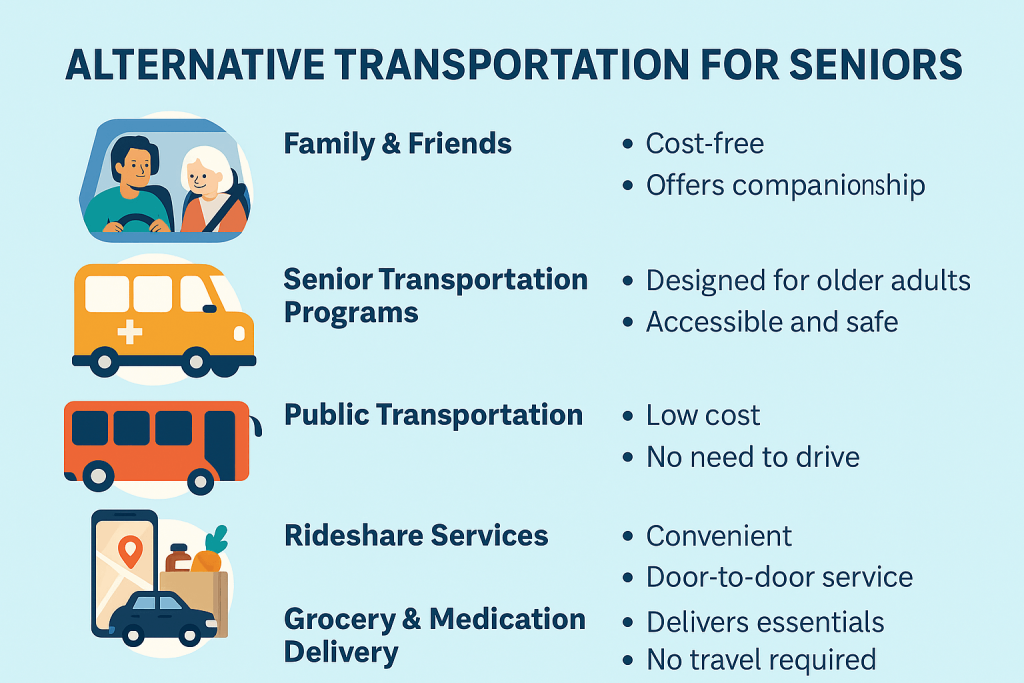Recently, a rumor started spreading online saying that beginning in August 2025, all seniors over the age of 70 would need to take new tests to keep their driver’s licenses. According to the story, seniors would have to go to the DMV every year, pass medical exams, and take road tests. This caused a lot of fear and confusion among older adults and their families.
Here’s the truth: That story is false. It came from a fake news website and has no basis in law. There is no new rule in the U.S. that forces seniors to take extra tests just because of their age.
In this article, we’ll break down what Florida law really says about older drivers, help you understand how to decide when it’s time to stop driving, and explain how home care services like Happy Mountain Home Care can support seniors who give up their car keys.
Debunking the Rumor About Senior Driving Laws
Several websites and news outlets, including Snopes and AL.com, have confirmed that the viral article about new driving laws is false. It claimed that starting in 2025, seniors over age 70 would face stricter rules for license renewal, including yearly in-person visits, vision exams, and even driving tests.
However, no such law has been passed at the federal level. In fact, the U.S. government does not control driver’s license rules, each state makes its own rules. While some states have additional requirements for older drivers, none of them require all seniors to take yearly driving tests.
So, if you or your loved one is worried about losing a license due to this supposed “new law,” don’t be. It is not real. What does matter, however, is staying safe and understanding what your state actually requires.
What Are the Real Rules for Senior Drivers in Florida?
Florida does have a few rules that apply to drivers once they reach a certain age, but they are designed to protect people, not punish them.
Here’s what the Florida Department of Highway Safety and Motor Vehicles requires:
- All drivers must renew their license every 8 years.
- At age 80, drivers must renew every 6 years instead of 8.
- Drivers age 80 or older must pass a vision test each time they renew their license.
The vision test can be done at a DMV location or submitted through a licensed eye doctor. If a person passes the vision test, they can continue driving.
There is no law that requires seniors to take memory or road tests, unless a medical issue is reported that may affect their ability to drive. In those cases, Florida may require a medical evaluation or additional testing—but that is based on health, not age.
If a senior no longer wants to drive, they can turn in their license and get a free state ID card. This ID can be used for anything that requires proof of identity, like doctor’s appointments, banking, and travel.
How to Know When It’s Time to Stop Driving
Even though Florida doesn’t require most seniors to stop driving at a certain age, it’s important to know the signs that it might no longer be safe.
Many older adults continue to drive safely into their 80s and even 90s. But others may notice changes in their body or mind that make driving harder. Here are some signs to watch for:
- Getting lost on roads that used to be familiar
- New dents or scratches on the car
- Slower reaction times when braking or making decisions
- Difficulty seeing road signs, traffic lights, or pedestrians
- Trouble hearing sirens, horns, or other important sounds
- Feeling anxious or nervous when behind the wheel
- Other drivers honking often or frequently getting passed
- Loved ones expressing concern about driving ability
Sometimes, just one of these things might not be serious. But if you notice a pattern or if more than one of these signs is happening, it’s time to talk about whether driving is still safe.
Having the Conversation With a Loved One
Talking to a parent or loved one about giving up their car keys can be tough. For many seniors, driving means freedom. Giving that up can feel like losing part of their independence.

Here are some tips to help make the conversation respectful and helpful:
- Pick a quiet time when you’re both calm and not rushed.
- Share what you’ve observed in a gentle way: “I noticed you seemed unsure when turning left the other day.”
- Focus on safety: “I just want to make sure you’re safe and don’t get hurt.”
- Offer support: “We’ll make sure you can still go everywhere you need.”
- Involve a doctor or other professional if needed to offer guidance.
Remember, the goal is not to take away independence, but to find safer ways for your loved one to stay active and connected.
What to Do If You’re Not Sure
Sometimes it’s hard to tell if someone should stop driving. If you’re unsure, there are a few things you can try:
- Ride along with your loved one and observe their driving habits
- Suggest a driving evaluation through a local driving school or occupational therapist
- Talk to their doctor about any health conditions or medications that could affect driving
Some seniors are open to the idea of driving less instead of stopping completely. For example, they might stop driving at night, on highways, or in bad weather. Gradually reducing driving can make the transition easier.
Transportation Options in Florida for Seniors
One of the biggest worries about giving up driving is: “How will I get around?” The good news is, there are lots of ways seniors can stay mobile and active:

- Family and Friends: Sometimes a simple schedule can help, maybe a daughter handles doctor visits, and a neighbor helps with errands.
- Senior Transportation Programs: Many Florida counties offer rides for older adults. These may include shuttle buses, door-to-door services, and volunteer driver programs.
- Public Transportation: Many cities in Florida offer discounted bus fares or special senior passes. Local routes are often easy to learn.
- Rideshare Services: Uber and Lyft can be a good choice, especially if someone helps the senior book the ride.
- Grocery and Medication Delivery: Reducing the need to travel helps. Many stores offer delivery services for groceries and prescriptions.
By planning ahead and trying different options, seniors can still enjoy life without driving.
How Happy Mountain Home Care Supports Seniors Who No Longer Drive
At Happy Mountain Home Care, we understand how hard it can be to give up driving. That’s why we offer transportation and daily support services to help seniors stay independent, safe, and engaged.
Our caregivers can:
- Drive seniors to doctor’s appointments
- Assist with grocery shopping and errands
- Provide companionship during outings
- Help with personal care, meal prep, and more
We serve families in Broward County and nearby areas. Our goal is to make sure seniors feel supported and never alone.
Whether it’s a few hours a week or daily visits, Happy Mountain Home Care is here to help.
It’s About Safety, Not Age
There is no law that says seniors must stop driving at a certain age. But sometimes, for health and safety reasons, it’s the right choice. The key is to look at each person’s abilities and situation.
If you or a loved one is unsure, start the conversation. Talk to a doctor. Take a test drive. Look into transportation options.
Giving up driving doesn’t have to mean giving up freedom. Happy Mountain Home Care is here to help with that next step.




